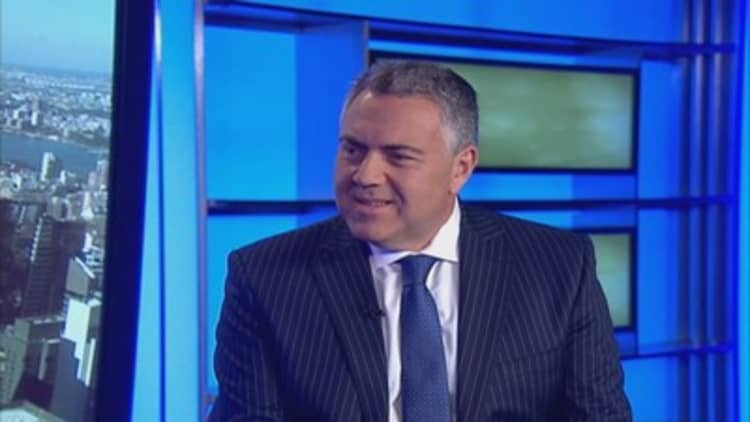
As the U.S. government shutdown looked set to move into its 15th day on Tuesday, Australian Treasurer Joe Hockey told CNBC the situation had taught his country a lesson on how not to handle domestic problems.
"There's a salient lesson here for the rest of the world in what's happening in the U.S. The world must live within its means and you cannot wait until five minutes to midnight to deal with the massive debt burden left by previous generations," said Hockey.
"Ultimately it comes down to a lesson for us in Australia [that] you cannot allow your domestic economy to get to this position," he added.
(Read More: Debt default damage already unfolding)
U.S. politicians have been stuck in a gridlock over deciding the new federal budget, which led the government to shut down two weeks ago. With the deadline for raising the government's debt ceiling only three days away, fears over a debt default have reached fever pitch. Some of the world's top bankers, along with the International Monetary Fund have all sounded warnings over the risk of a default, in recent weeks.
The Australian Treasurer described the possibility of a U.S. debt default as "almost inconceivable" but said if it did happen, it would undoubtedly affect the global economy. He added that he was concerned the shutdown might set a precedent for how disputes are dealt with in future.
"The question is: how are they [Congress] going to ensure that this extraordinary period of uncertainty does not become the norm for the rest of the Obama administration's term in office? That's the big issue," he added.
(Read More: If US defaults,will China bail on Treasurys?)
On Monday U.S. senators said they were that would reopen the government and push back a possible default for several months, although they said many hurdles remained.
But the inability for politicians to resolve their differences, despite rising concerns at home and across the rest of the global economy, is undoubtedly affecting the world's perception of the U.S.
(Read More: Three ways a debt default could affect you)
This week, an op-ed from China's state news agency Xinhua published Sunday conveyed Beijing's frustration with the political impasse and said it was time to start building a "de-Americanized world."
Hockey commented on this view in his interview with CNBC.
"Well the world needs America and America needs the world. And I think it's that second part that's been lost to Congress. America does need the world economy to function," he said.
Hockey told CNBC that the U.S.'s credibility had not been eroded in Australia's eyes. However, he said they were unhappy with President Barack Obama's no-show at the Asia-Pacific Economic Cooperation (APEC) conference which took place in Bali, Indonesia earlier this month.
(Read more: )
"The fact that they were unable to attend because of domestic problems sent the wrong message," he said.
Hockey also told CNBC he was not concerned about slowing growth in China, Australia's largest trading partner, after a surprise fall in export growth in September.
He acknowledged that growth in the world's number two economy would likely slump as policy makers focused more on stimulating domestic demand, but said people vastly underestimated the "enormous" growth potential in the rest of Asia, highlighting Japan, Korea, Vietnam and Indonesia as hot spots.
The Australian Treasurer also flatly denied the formation of a bubble in Australia's frothy property market.
(Watch this: Australia's Housing Bubble - Fact or Fiction?)
"A lot of commentators don't understand the Australian housing market... Australia is a long way from a housing bubble," he said.
—By CNBC's Katie Holliday: Follow her on Twitter @hollidaykatie

